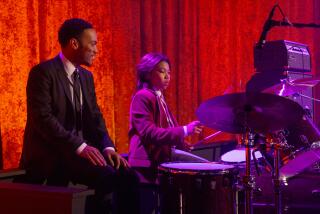Running his career up the flagpole
- Share via
RYAN PHILLIPPE went through a lot of soul searching after his first child, Ava, was born seven years ago.
After being cast as a teen dream in such hits as “I Know What You Did Last Summer,” Phillippe began questioning whether acting was really his chosen calling -- “Should I be doing something more important than making movies? Was it substantial enough?”
Phillippe, 32, decided to be more discriminating in the type of roles he would accept. Whereas his wife, Reese Witherspoon, has made such high-profile films as the “Legally Blonde” comedies, “Sweet Home Alabama” and “Walk the Line,” for which she won the best actress Oscar, Phillippe has been quietly building his own reputation in grittier, more independent fare such as 2001’s “Gosford Park” and the 2005 Academy Award-winning best film “Crash,” in which he played a naive Los Angeles cop. His latest film is Clint Eastwood’s World War II epic “Flags of Our Fathers,” which opens Friday.
“I don’t do anything I wouldn’t want to see or have seen before,” he said. “I don’t have the time. Life is too short. I have kids. If I’m going to spend time away from them and devote myself to a job or a project, it has to be worth my while. There was a time I thought I was making these choices to change peoples’ perception of me. I realized it was to change my perception of myself. I need to be able to look in the mirror and sleep at night knowing what I do means something.”
And Phillippe says he’s growing and learning as an actor.
“It’s something I have an ability to do and a passion for it. I had to kind of rekindle the desire. It’s funny to be my age and go through a career burnout. I made my first movie when I was 19, and I’ve made 26 movies.”
It doesn’t bother him that his wife is the bigger star. “I’m the least competitive person you’d ever meet,” he said matter-of-factly. “She is great at what she does and has a great career, and my career is solid. I am proud of her.”
ON this recent late afternoon, Phillippe was exhausted. For the last few weeks he had been working nights in Austin, Texas, on director Kimberly Peirce’s (“Boys Don’t Cry”) untitled project, a drama about an Iraq war veteran. He had been filming since 7:30 that morning and had flown in on a private plane to talk about “Flags of Our Fathers.” With just two hours’ sleep, Phillippe was bleary-eyed and looked like he had slept in his clothes.
Based on the bestselling book by James Bradley with Ron Powers, “Flags” revolves around three men featured in Joe Rosenthal’s indelible Pulitzer Prize-winning photograph of five Marines and one Navy corpsman raising the U.S. flag on Mt. Suribachi on Iwo Jima on Feb. 23, 1945. The photograph turned them into heroes, and the three survivors were sent to the United States to bolster sales for the government’s seventh war bond tour. Ultimately, they helped raise $24 billion for the war.
The three men -- the level-headed corpsman John “Doc” Bradley (Phillippe), the ambitious Rene Gagnon (Jesse Bradford) and American Indian Ira Hayes (Adam Beach) -- all felt guilty for leaving their fellow soldiers and had a hard time coping with their newfound celebrity. For Gagnon and Hayes, their lives after World War II ended in disappointment. Bradley shut off the war, got married, had a family and worked as a successful undertaker.
Phillippe found Eastwood eager to create an atmosphere of creativity on the set. “He treats people with respect and a dignity,” he said. “His sets are quiet and efficient and open. He casts his movies in every department and trusts the people he hires to do the job the right way. He gives them the freedom ... he likes surprises. There isn’t the emphasis placed on everything being perfect. He likes rough around the edges. It was really freeing for me.”
He asked Eastwood not to tell him when charges would be set off while shooting the graphic combat sequences because Phillippe wanted to be able to react with genuine surprise. “So did he,” he said. “He would definitely surprise us with the odd bomb here or there that would just go off. You would look to your left and you would see 500 guys holding rifles and your mind starts to play tricks on you. It feels like the real thing. You are running across rocky, sandy terrain and an explosion goes off and you are lost in a cloud of sand for five or 10 seconds. It feels pretty real.”
EASTWOOD wasn’t that familiar with Phillippe until he began working with Paul Haggis, his “Million Dollar Baby” and “Flags of Our Father” screenwriter. “Paul gave me an early look at his picture ‘Crash,’ ” Eastwood recalled. “I liked him very much in it. I liked his sensibilities as a performer. Some of those sensibilities cross over in his choices in other material.”
Phillippe, said Eastwood, embodies Bradley. “I was reading correspondence from the real John Bradley last night ... regarding what happened to some of the guys [at Iwo Jima]. Just the way [Bradley] talked about it ... I would see it on Ryan’s face. Ryan just captured it right away, he got a good hook on the attitude of the guy.”
Costar Bradford remarked that Phillippe’s performance is “subtle because he’s so even-keeled and spot on to what the guy was really like. It’s not overt.”
Phillippe welcomed the fact that Bradley was a man of few words.
“I am always looking to cut dialogue in movies,” he explained. “You have more of an open connection with the audience if you are allowing them to put the words in your head based on what your eyes and your body are telling them. When you are saying it verbally, that takes away from the audience, their interactivity on some level.”
Both of Phillippe’s grandfathers served in World War II. “The one I was very close to, my maternal grandfather, fought in Germany and won a Bronze Star. He was open with me ... I was fascinated with his war stories.”
Phillippe was 21 when he held his maternal grandfather as he passed away. “Ten minutes before he died, he was saying names. After he passed, I talked to my grandmother and asked her whom these names were. She said they were his buddies he served with. The impact of war, those relationships formed during it, never leaves. That’s amazing to me.”
More to Read
Only good movies
Get the Indie Focus newsletter, Mark Olsen's weekly guide to the world of cinema.
You may occasionally receive promotional content from the Los Angeles Times.









